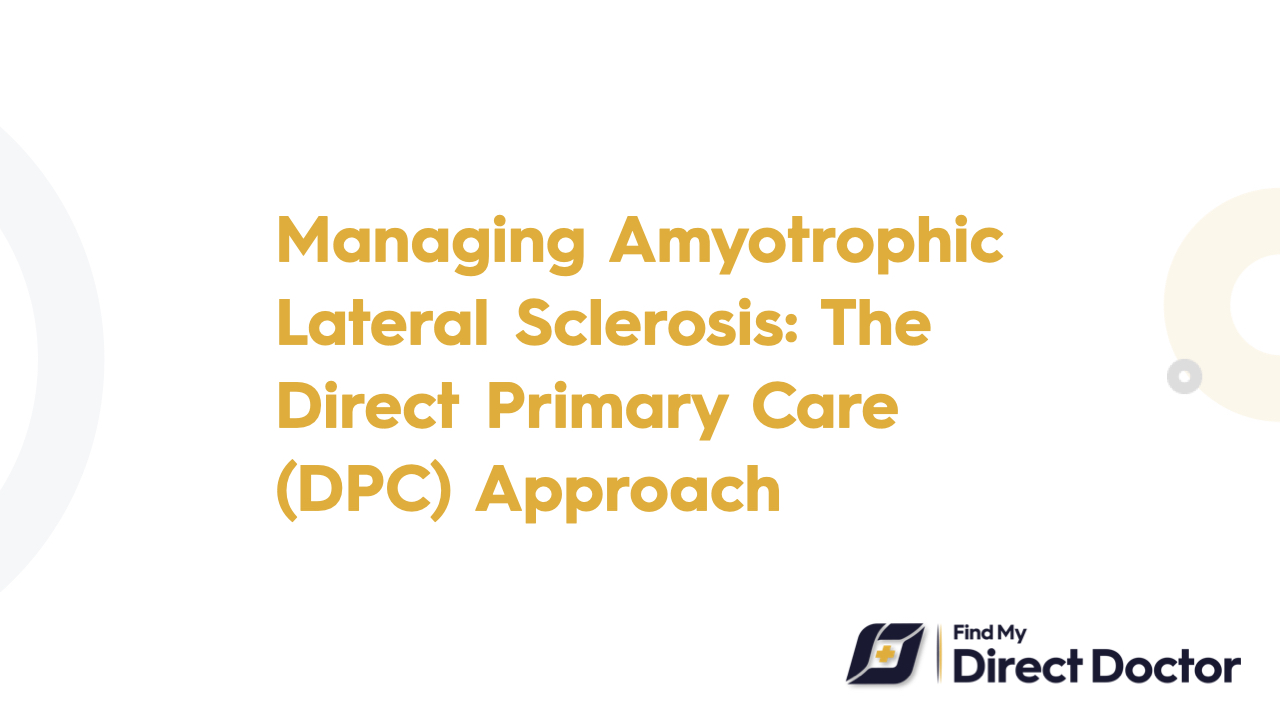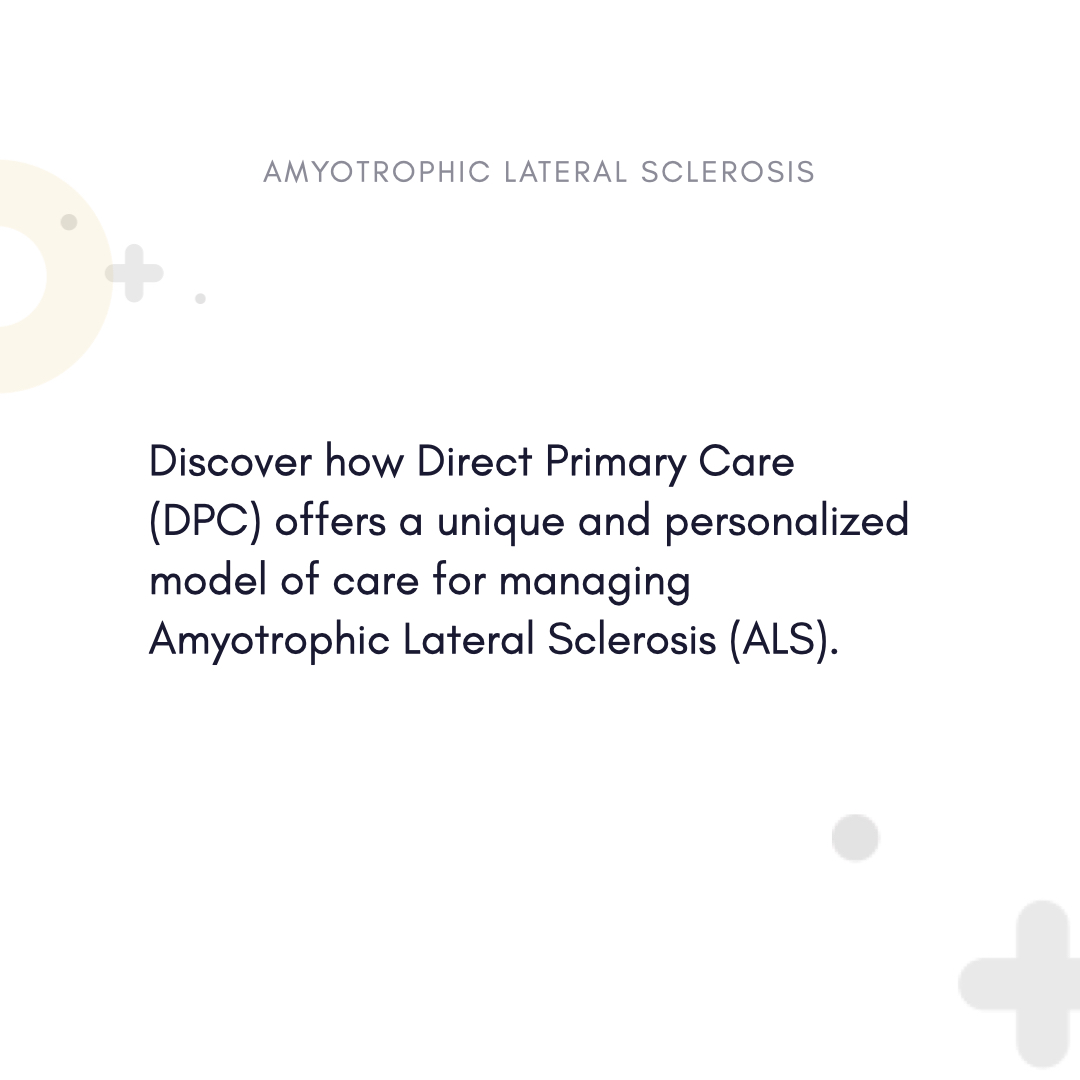Amyotrophic Lateral Sclerosis (ALS) and Direct Primary Care (DPC): Compassionate, Continuous Care for Progressive Challenges
Progressive neurodegenerative disease amyotrophic lateral sclerosis (ALS) causes muscle weakness, paralysis, and finally respiratory failure. Managing ALS calls for an all-encompassing strategy, regular monitoring, and adaptive treatment—needs sometimes unmet in conventional medicine. Direct Primary Care (DPC) presents a patient-centered approach with affordable symptom management, quick access to experts, and individualized support meant to improve quality of life.

Understanding ALS: Principal Difficulties
- Symptoms: Muscle weakness, trouble swallowing or speaking, respiratory decline, spasticity
- Causes: Genetic (e.g., C9orf72, SOD1 mutations) or sporadic (90%)
- Complications: Malnutrition, aspiration pneumonia, caregiver burnout, respiratory failure
- Diagnosis: Clinical tests, EMG, MRI, genetic testing
DPC Improves ALS Management
Offering unrestricted access to a primary care physician, Direct Primary Care (DPC) is a membership model (USD100–USD200/month). This translates for ALS sufferers as:
- Not waiting for specialist coordination or urgent symptom evaluations
- Clear pricing for discounted therapies, tools, and drugs
- Medical, emotional, and logistical support for patients and caregivers combined in a holistic approach
1. Fast Diagnosis and Interdisciplinary Coordination
- Referrals to neurology: Schedule early diagnosis EMG/MRI visits quickly
- Genetic testing: Cash-pay rates for panels (USD300–USD500 against USD1,500+)
- Expert network: Work alongside speech-language pathologists, physical therapists, and pulmonologists
2. Customized Symptomatic Management
DPC combines following ALS Association recommendations:
- Medications:
- Disease-modifying treatments at wholesale rates (30–50% savings): Riluzole or edaravone
- For spasticity: Baclofen; for emotional health: Antidepressants
- Non-pharmacological strategies:
- Coordinate cough assist devices and BiPAP machines for respiratory support
- Nutrition plans: High-calorie diets, PEG tube placement recommendations
- Caregiver training: Instruct safe transfers, suctioning, and emergency response
- Affordable referrals to home health aides provide respite care
- Align treatment with patient/family wishes (e.g., hospice)
DPC's Advantages for ALS Patients
Continuity of Treatment and Accessibility
- Regular monitoring: Adjust therapies or medications as mobility declines
- 24-hour availability: Manage respiratory discomfort via telehealth
Customized Care Schedules
- Tailored plans for nutrition, respiratory decline, and spasticity
- Quick fixes for issues like aspiration pneumonia
Diminished Administrative Load
- No insurance paperwork lets doctors focus on patient needs
- Simplified coordination with specialists (neurologists, therapists) guarantees complete treatment
Customized ALS Treatment at DPC
The American Academy of Neurology stresses ALS patients receiving individualized treatment. DPC supplies this via:
1. Adaptive Care Strategies
- Early stage: Emphasize speech therapy and mobility aids (wheelchairs, braces)
- Midstage: Add PEG tube planning and respiratory support
- Late-stage: Integrate palliative care and hospice coordination
2. Interdisciplinary Cooperation
- Physical therapy: Home exercise plans to slow muscle loss
- Respiratory therapy: Regular lung function tests and BiPAP adjustments
- Nutrition: Calorie-dense recipes to prevent malnutrition
3. Patient and Family Education
- Open talks on disease progression, decisions, and expectations
- Train caregivers to use assistive tools and spot crises
Actual Achievements Stories
- Case 1: 52-year-old Michael avoided hospitalization for aspiration pneumonia with DPC-coordinated speech therapy and suction devices
- Case 2: 60-year-old Linda saved USD800/month on riluzole and BiPAP rentals using DPC’s transparent pricing
Frequent Questions: DPC and ALS
- Q: Can DPC write prescriptions for edaravone or riluzole?
A: Yes. DPC doctors coordinate financial assistance programs and oversee these drugs
- Q: How does DPC handle equipment like BiPAP machines?
A: DPC works with vendors to provide discounted rentals or purchases
- Q: Is there coverage for genetic testing?
A: Self-pay rates start at USD300–USD500 for C9orf72/SOD1 panels
Why DPC Is Crully Important for ALS Treatment
- Reduces delays: Instant access to specialists slows disease progression
- Cuts expenses: Affordable tools and treatments ease financial burden
- Prioritizes dignity: Personalized care aligns with patient goals at every stage
How DPC Specifically Improves ALS Treatment
ALS calls for flexibility and compassion. DPC’s approach fits ALS Association guidelines by:
- Simplifying complexity: One doctor manages all treatment facets
- Empowering families: Education and respite resources reduce burnout
- Honoring autonomy: Treatment decisions respect patient wishes
Why DPC Transforms ALS Care
While ALS is unrelenting, DPC offers a framework to navigate its challenges:
- Preventive symptom control: Early complication detection through frequent assessments
- Seamless coordination: Central hub for neurologists, therapists, and palliative teams
- Caregiver support: Mental health tools and training ease family burdens
Navigate ALS Confidently with DPC
Though ALS is complicated, you don’t have to face it alone. With DPC, you gain a partner ensuring:
- Timely interventions to preserve quality of life
- Affordable treatments with transparent pricing
- Consistent support to live fully, every day






